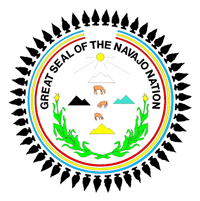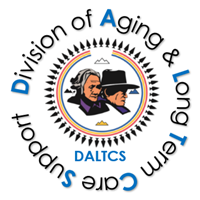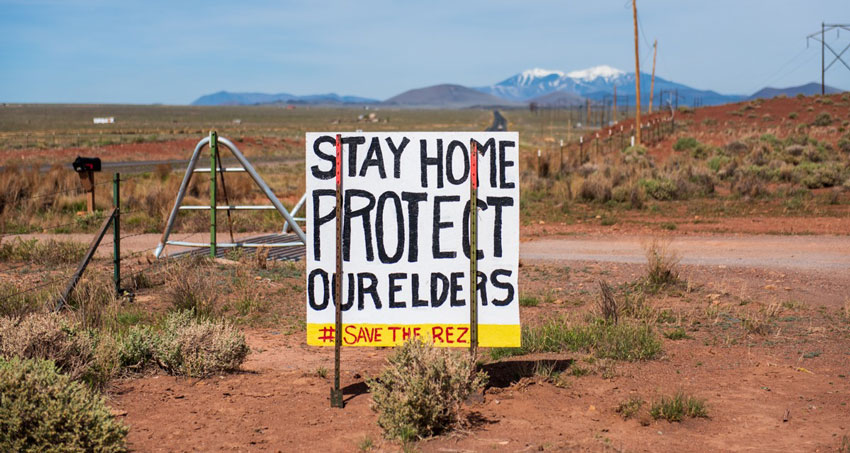Title VI Spotlight: Navajo Nation
The NRCNAA is proud to spotlight programs they have been able to partner with.
 Anslem Lewis, Jr., shares something his grandma reminds him of: the reason he has a job is because of the Elders
on the Navajo Nation reservation. So, he needs to continue to take care of them. It is advice he has taken to
heart, and he uses in his everyday work.
Anslem Lewis, Jr., shares something his grandma reminds him of: the reason he has a job is because of the Elders
on the Navajo Nation reservation. So, he needs to continue to take care of them. It is advice he has taken to
heart, and he uses in his everyday work.
Lewis is the interim health service administrator charged with overseeing the Division of Aging and Long-term Care Support for the Navajo Nation. Having worked with the Division for nearly three years now, he is all too familiar with the needs of the Elders that his department, serves. Heat, food, reading glasses, hearing aids, dentures, and knowing others care for them, are some of the most pressing needs his office sees.
 “It goes back to our teaching,” Lewis shares. “We do as much as we can to respect our Elders, take care of them,
no matter whose grandma or grandpa they are, it is something that is embedded in us as young kids.”
“It goes back to our teaching,” Lewis shares. “We do as much as we can to respect our Elders, take care of them,
no matter whose grandma or grandpa they are, it is something that is embedded in us as young kids.”
Lewis oversees five agencies, 80 senior centers, and a staff of 250, including drivers, cooks, program supervisors, and office staff. He is also overseeing the finance personnel, including the vital Title VI funding. And he understands the significance of grasping the needs of the elderly population.
COVID Challenges
And he knows he wouldn't be able to serve the large Elder community, spreading across three states (Arizona, New Mexico, and Utah), without the dedication of his staff. This was especially true throughout the pandemic, when congregate meals were halted at the senior centers. Only curb side or home delivered meals were available.
“Big shout out to my team. If it wasn't for them, a lot of the Elders wouldn't get the supplies they need. It was the field staff, senior center staff, the supervisor, cook, and drivers; they are the ones that kept giving our Elders hope. We are thankful, without them none of this would have been possible.”
He continued talking about the current efforts, “We are still slowly trying to get out of this, trying to get back to normal. Some elders are still afraid. This is a once in a lifetime pandemic, in our lifetime, and it is something they are afraid of. This goes back to the origin stories, our traditional stories, when something this big comes around, it is taboo and telling us something, so they are probably taking more precaution than the younger generation.”
The pandemic presented several challenges for Lewis and his staff. One of their primary goals is to ensure Elders have nutritional options, so when the senior centers closed indoor dining, requests for home delivered meals greatly increased, leading to food shortages from their vendors. They were competing with other organizations for food supplies, often vendors had limited hours, and the number of people allowed in facilities was also limited. One saving grace was that some local vendors offered a senior day, letting senior centers shop during certain hours on designated days, helping to cater to the Elder population.
Another challenge was transportation. The additional wear and tear on vehicles making the deliveries created breakdowns and increased time spent trying to secure another vehicle. Another transportation need from Elders was bringing them to get vaccinated if they wanted to, or if they were sick, they would need a ride to get tested.
The Navajo Nation, like many reservations across the country, had great loss due to the pandemic, and this included Elders and Lewis's staff.
“We lost some staff,” says Lewis, “who were still working and caught the virus. It didn't end well for them. It hit home for us, because we lost some Elders, and when it is a routine to deliver to someone and they aren't there anymore, it takes a toll. And when you lose staff, that hurts too. We lost six or seven drivers.”
The Elders really missed the socializing that COVID took from them, so Lewis's staff worked to hold five to six Elder Fests around communities to bring people together and provide lunch. To help people stay active, they have been providing some exercise activities, stress balls, exercise bands, and are working on getting more crossword and puzzles.

Lifeline for Elders
Often driving on dirt roads, meal delivery drivers provide a much-needed lifeline for the elderly population. In rural locations where phone lines are rare, and internet connections are rarer, when an elderly individual or family needs something, they share it with their local driver.
Whether it is wood to keep their house heated during the winter; or water to use for drinking, cooking, or cleaning; or medical care; it is the delivery drivers who are in touch with these residents, and who bring their needs and concerns to the local senior center. Drivers can even help with laundry, taking it to the senior center to be cleaned.
“It is mostly my senior center staff that goes beyond for the Elders, they are the success of this program. They take that role as a caregiver for now.”
Learning on the Job
Lewis has been working with the Aging Division since the early days of COVID-19 when he was laid off from his construction job. He applied for a planner position with the Division and slowly kept moving up, to a program and project specialist, and through leadership turnover, has found himself leading the efforts to advocate and care for the elderly of the largest American Indian reservation in the United States. After seven months, this is a position he intends to remain in until a permanent health service administrator is hired. And he plans to apply once the position gets posted.
On a daily basis, he checks in with his agency staff and has a goal of getting projects and tasks completed within a one-two day turnaround. With a staffing shortage, he finds himself doing some of the finance work, submitting documents for payments, bills, ordering food supplies, and other duties. He has meetings with stakeholders, works with personnel matters, talks to Elders when they call, and he prepares presentations for the new tribal council and the oversight committee.
When he thinks of his job in terms of knowing what to do, it has been a “crash course in a lot of stuff, and still is.” He continues to learn day by day.
Little Things, Big Rewards
The most rewarding part of his job is when he hears stories from the senior centers. One of the programs allows Elders to apply for items such as reading glasses, hearing aids, or dentures. Often Elders are not aware of the program, so a meal delivery driver might ask about a need. One woman was asked if she needed glasses. Her response was that she was able to see, so it was good enough. But when she put the glasses on and was handed a newspaper, she was able to read the news herself. She no longer had to rely on anyone to read it to her through their lens. Because of a simple item, she gained some of her independence back.
“The price of everything is going up,” Lewis says, “so we try to help out as much as we can. Sometimes Indian Health Services (IHS) or Medicaid will provide services but often, we are a last resort. This program has been really successful. I think within our first quarter we served over 800 Elders with one of those three needs. I would like to advocate more with our council because that funding is based on the stock market since it's in a trust fund. If the stock market does well, we do well. I wish we could have a set allocation for that.”
He is grateful for a recent donation of 10,000 reading glasses that his department was able to distribute in January. “It really is the little things that most of us take for granted, that bring light into people's life,” he said.
Building Toward the Future
Lewis is proud of all his staff has been able to do over the past three years and looks forward to the future. After years of staff shortages, the Division is in the process of hiring key positions such as an ombudsman, a caregiver specialist, and a permanent health services administrator. This will increase the amount of services they are able to offer on the reservation.
Lewis remembers the reminder from his grandma about taking care of Elders. “We try our best to have them be self-sufficient, and provide the services we can, to keep them at home. We are only getting better. I would like to provide more and more services that are out there. Hopefully in the next couple years, we will be a strong Aging department.”